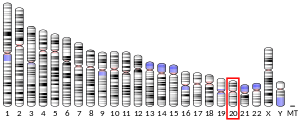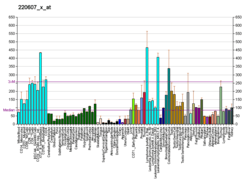TH1L
Negative elongation factor C/D is a protein that in humans is encoded by the TH1L gene.[5][6][7]
Function
The NELF complex of proteins interacts with the DSIF protein complex to repress transcriptional elongation by RNA polymerase II. The protein encoded by this gene is an essential part of the NELF complex. Alternative translation initiation site usage results in the formation of two isoforms with different N-termini.[7]
Interactions
TH1L has been shown to interact with:
gollark: It's CLOUD™ because it runs on my personal server.
gollark: Because it runs on my server, therefore cloud.
gollark: It's a CLOUD RSS reader.
gollark: Perhaps I should import xkcd into my search engine.
gollark: I read it in my RSS reader, at least.
References
- GRCh38: Ensembl release 89: ENSG00000101158 - Ensembl, May 2017
- GRCm38: Ensembl release 89: ENSMUSG00000016253 - Ensembl, May 2017
- "Human PubMed Reference:". National Center for Biotechnology Information, U.S. National Library of Medicine.
- "Mouse PubMed Reference:". National Center for Biotechnology Information, U.S. National Library of Medicine.
- Bonthron DT, Hayward BE, Moran V, Strain L (Aug 2000). "Characterization of TH1 and CTSZ, two non-imprinted genes downstream of GNAS1 in chromosome 20q13". Human Genetics. 107 (2): 165–75. doi:10.1007/s004390000344. PMID 11030415.
- Zhang QH, Ye M, Wu XY, Ren SX, Zhao M, Zhao CJ, Fu G, Shen Y, Fan HY, Lu G, Zhong M, Xu XR, Han ZG, Zhang JW, Tao J, Huang QH, Zhou J, Hu GX, Gu J, Chen SJ, Chen Z (Oct 2000). "Cloning and functional analysis of cDNAs with open reading frames for 300 previously undefined genes expressed in CD34+ hematopoietic stem/progenitor cells". Genome Research. 10 (10): 1546–60. doi:10.1101/gr.140200. PMC 310934. PMID 11042152.
- "Entrez Gene: TH1L TH1-like (Drosophila)".
- Yuryev A, Wennogle LP (Feb 2003). "Novel raf kinase protein-protein interactions found by an exhaustive yeast two-hybrid analysis". Genomics. 81 (2): 112–25. doi:10.1016/s0888-7543(02)00008-3. PMID 12620389.
- Yin XL, Chen S, Gu JX (Feb 2002). "Identification of TH1 as an interaction partner of A-Raf kinase". Molecular and Cellular Biochemistry. 231 (1–2): 69–74. doi:10.1023/A:1014437024129. PMID 11952167.
- Ewing RM, Chu P, Elisma F, Li H, Taylor P, Climie S, McBroom-Cerajewski L, Robinson MD, O'Connor L, Li M, Taylor R, Dharsee M, Ho Y, Heilbut A, Moore L, Zhang S, Ornatsky O, Bukhman YV, Ethier M, Sheng Y, Vasilescu J, Abu-Farha M, Lambert JP, Duewel HS, Stewart II, Kuehl B, Hogue K, Colwill K, Gladwish K, Muskat B, Kinach R, Adams SL, Moran MF, Morin GB, Topaloglou T, Figeys D (2007). "Large-scale mapping of human protein-protein interactions by mass spectrometry". Molecular Systems Biology. 3: 89. doi:10.1038/msb4100134. PMC 1847948. PMID 17353931.
- Narita T, Yamaguchi Y, Yano K, Sugimoto S, Chanarat S, Wada T, Kim DK, Hasegawa J, Omori M, Inukai N, Endoh M, Yamada T, Handa H (Mar 2003). "Human transcription elongation factor NELF: identification of novel subunits and reconstitution of the functionally active complex". Molecular and Cellular Biology. 23 (6): 1863–73. doi:10.1128/mcb.23.6.1863-1873.2003. PMC 149481. PMID 12612062.
Further reading
- Stevens M, De Clercq E, Balzarini J (Sep 2006). "The regulation of HIV-1 transcription: molecular targets for chemotherapeutic intervention". Medicinal Research Reviews. 26 (5): 595–625. doi:10.1002/med.20081. PMC 7168390. PMID 16838299.
- Bonaldo MF, Lennon G, Soares MB (Sep 1996). "Normalization and subtraction: two approaches to facilitate gene discovery". Genome Research. 6 (9): 791–806. doi:10.1101/gr.6.9.791. PMID 8889548.
- Yamaguchi Y, Takagi T, Wada T, Yano K, Furuya A, Sugimoto S, Hasegawa J, Handa H (Apr 1999). "NELF, a multisubunit complex containing RD, cooperates with DSIF to repress RNA polymerase II elongation". Cell. 97 (1): 41–51. doi:10.1016/S0092-8674(00)80713-8. PMID 10199401.
- Ping YH, Rana TM (Apr 2001). "DSIF and NELF interact with RNA polymerase II elongation complex and HIV-1 Tat stimulates P-TEFb-mediated phosphorylation of RNA polymerase II and DSIF during transcription elongation". The Journal of Biological Chemistry. 276 (16): 12951–8. doi:10.1074/jbc.M006130200. PMID 11112772.
- Yin XL, Chen S, Gu JX (Feb 2002). "Identification of TH1 as an interaction partner of A-Raf kinase". Molecular and Cellular Biochemistry. 231 (1–2): 69–74. doi:10.1023/A:1014437024129. PMID 11952167.
- Narita T, Yamaguchi Y, Yano K, Sugimoto S, Chanarat S, Wada T, Kim DK, Hasegawa J, Omori M, Inukai N, Endoh M, Yamada T, Handa H (Mar 2003). "Human transcription elongation factor NELF: identification of novel subunits and reconstitution of the functionally active complex". Molecular and Cellular Biology. 23 (6): 1863–73. doi:10.1128/MCB.23.6.1863-1873.2003. PMC 149481. PMID 12612062.
- Yuryev A, Wennogle LP (Feb 2003). "Novel raf kinase protein-protein interactions found by an exhaustive yeast two-hybrid analysis". Genomics. 81 (2): 112–25. doi:10.1016/S0888-7543(02)00008-3. PMID 12620389.
- Liu W, Shen X, Yang Y, Yin X, Xie J, Yan J, Jiang J, Liu W, Wang H, Sun M, Zheng Y, Gu J (Mar 2004). "Trihydrophobin 1 is a new negative regulator of A-Raf kinase". The Journal of Biological Chemistry. 279 (11): 10167–75. doi:10.1074/jbc.M307994200. PMID 14684750.
- Colland F, Jacq X, Trouplin V, Mougin C, Groizeleau C, Hamburger A, Meil A, Wojcik J, Legrain P, Gauthier JM (Jul 2004). "Functional proteomics mapping of a human signaling pathway". Genome Research. 14 (7): 1324–32. doi:10.1101/gr.2334104. PMC 442148. PMID 15231748.
- Stelzl U, Worm U, Lalowski M, Haenig C, Brembeck FH, Goehler H, Stroedicke M, Zenkner M, Schoenherr A, Koeppen S, Timm J, Mintzlaff S, Abraham C, Bock N, Kietzmann S, Goedde A, Toksöz E, Droege A, Krobitsch S, Korn B, Birchmeier W, Lehrach H, Wanker EE (Sep 2005). "A human protein-protein interaction network: a resource for annotating the proteome". Cell. 122 (6): 957–68. doi:10.1016/j.cell.2005.08.029. hdl:11858/00-001M-0000-0010-8592-0. PMID 16169070.
- Yang Y, Liu W, Zou W, Wang H, Zong H, Jiang J, Wang Y, Gu J (May 2007). "Ubiquitin-dependent proteolysis of trihydrophobin 1 (TH1) by the human papilloma virus E6-associated protein (E6-AP)". Journal of Cellular Biochemistry. 101 (1): 167–80. doi:10.1002/jcb.21164. PMID 17131388.
This article is issued from Wikipedia. The text is licensed under Creative Commons - Attribution - Sharealike. Additional terms may apply for the media files.




